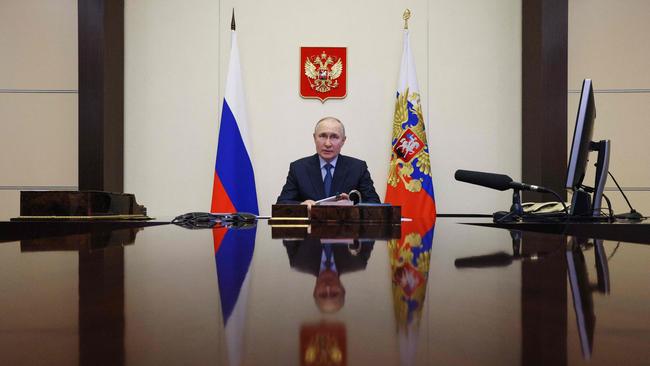Leak spotlights Russian infighting, Wagner’s role in Ukraine war
US says Kyiv remains confident in its ability to launch a counter-offensive while a leak exposes infighting within Moscow.

Leaked documents purporting to contain Pentagon presentations depicted Russia’s military leadership as distracted by infighting over the war in Ukraine and grappling with the outsized role played there by the paramilitary Wagner Group.
The Pentagon and Justice Department last week launched an investigation after purported US Defence Department documents were posted online and amplified by Russian, pro-Kremlin Telegram channels. The Wall Street Journal wasn’t able to independently authenticate the leaked documents, but they contain enough detail to give them credibility.
Defence officials have said they believe some of the documents could be authentic, though some also appear to have been altered. Washington has sought to assess the damage from the intelligence breach, which could be one of the most significant leaks.
The documents appear to shed light on shortages in Ukraine’s air-defence arsenal, the vulnerabilities of some US weapons provided to Kyiv and the composition and armaments of nine army brigades being trained by the US and allies for a coming spring offensive. Officials in Kyiv have sought to play down the leaks and any doubts about Ukraine’s ability to push Russia out of its territory.
Defence Secretary Lloyd Austin on Tuesday said Ukraine remains confident in its capacity to launch its counteroffensive against Russia.
The documents also appear to paint a negative picture of the state of Russia’s war effort and fraying cohesion at the top of its military command, with one of the files detailing arguments between military leaders and a paramilitary commander that prompted President Vladimir Putin to intervene. According to one of the US documents, Valeriy Gerasimov, the chief of Russia’s General Staff, ordered a stop to munitions supplies for the Wagner Group on February 12, at a time when its units were suffering significant losses in the campaign to seize the eastern city of Bakhmut after months of heavy fighting.
Wagner founder Yevgeny Prigozhin has used the force’s battlefield presence to gain sway with the Kremlin, publicly taking credit for victories such as January’s seizure of Soledar north of Bakhmut and the capture of Severodonetsk last summer. But by late February, he was openly criticising Russia’s military leadership, attacking General Gerasimov and Defence Minister Sergei Shoigu for preventing his fighters from getting the ammunition they need.
There is simply direct opposition going on, which is nothing more than an attempt to destroy Wagner,” Mr Prigozhin said, saying the ammunition was sitting in warehouses but officials were preventing it from reaching his men.
According to an image of the leaked document, which has no visible publication date but is part of a batch dating to late February, the Russian Defence Ministry in mid to late February was struggling to counter the claims by Mr Prigozhin, a Putin ally, because the Kremlin was making no moves to rein him in and his high profile made it difficult to discredit the narrative he was advancing on social media.
The document cited a Wagner “affiliate”, Vladislav Andriyevsky, as saying that Mr Prigozhin was ultimately called into a meeting with Mr Putin and General Shoigu that was aimed at calming tensions between the two men.
Russia’s Defence Ministry didn’t respond to a request for comment on any standoff between Mr Prigozhin and General Shoigu or on Mr Prigozhin’s comments about shortages of ammunition for Wagner and how they could affect the war effort.
Other documents in the apparent leak said that Wagner, short of arms and ammunition, sought in early February to acquire weapons in Turkey, a NATO member, meeting with Turkish contacts in an effort to broker such a deal. Western diplomats in Ankara said that Turkey’s government was unlikely to agree to a weapons sale to Wagner, but that didn’t rule out the possibility that its operatives could try to seek weapons on the black market.
A spokesman at Turkey’s Defence Industry Agency, which oversees the country’s growing weapons industry, said they had no information about the allegations in the leaked documents.
Turkey also has a history of opposing the Wagner group in war. In 2020, Turkish drones, intelligence and military advisers helped the internationally recognised government of Libya push back an attack by a Russian-backed militia leader who attacked Tripoli. Wagner forces played a key role in helping militia commander Khalifa Haftar in his assault on Tripoli, which collapsed after Turkey sent military aid to the government.
The US government has dialled up pressure on Turkey in recent months over concerns about exports of raw materials, electronics and industrial items to Russia that the Kremlin needs for its military. However, there has been no evidence of Turkey sending weapons to the Russian military. The Treasury Department on Wednesday sanctioned two companies and two individuals from Turkey for helping Russian defence firms obtain electronics.
According to another purported US document, Russia’s Federal Security Service accused the Defence Ministry of under-reporting Russian casualties in Ukraine by excluding deaths among units that don’t form part of the armed forces, such as Wagner and the National Guard. FSB officials calculated that the number of Russians wounded or killed in action in Ukraine was around 110,000, far in excess of official estimates.
The National Guard has been tasked since the start of Russia’s invasion of Ukraine with stifling protests on occupied Ukrainian territory and guarding strategic objects, but it has also suffered losses among personnel involved in defending frontline positions, one of the leaked documents said. It said personnel losses in National Guard units undermine Russia’s ability to hold occupied parts of Ukraine.
The Wall Street Journal



To join the conversation, please log in. Don't have an account? Register
Join the conversation, you are commenting as Logout